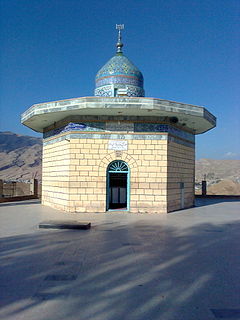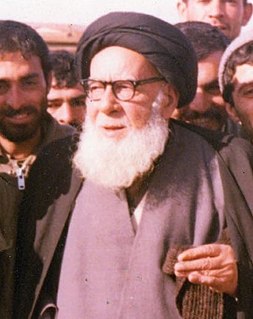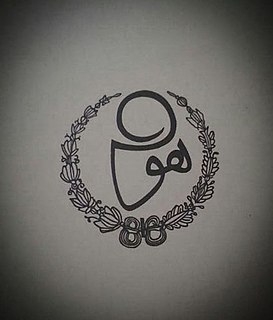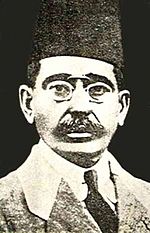
Mahdism in the Twelver branch of Shia Islam, derived from the belief in the reappearance of the Twelfth Shiite Imam, Muhammad al-Mahdi as the savior of the apocalypse for the salvation of human beings and the establishment of peace and justice. Mahdism is a kind of messianism. From this perspective, it is believed that Jesus Christ and Khidr are still alive and will emerge with Muhammad al-Mahdi in order to fulfil their mission of bringing peace and justice to the world.
Shams al-Din is an Arabic personal name or title.
The list is not comprehensive, but is continuously being expanded and includes Persian poets as well as poets who write in Persian from Iran, Azerbaijan, Iraq, Georgia, Dagestan, Turkey, Syria, Afghanistan, Turkmenistan, Tajikistan, Uzbekistan, Lebanon, China, Pakistan, India and elsewhere.

Ahmad Khan Daryabeigi graduated from Dar ul-Funun school with degrees in engineering and military studies. His research in 1887 provided the landscape for official Iranian claims to its three island. During Naser al-Din Shah Qajar, he became the first Iranian captain of the Persepolis Battleship in Bushehr which recently Iran had purchased from Germany and designed the first Iranian Navy uniform and later became the Lord Admiral of the Persian Gulf. In 1893, about 22 years before the First World War, he became the Governor of Bushehr and Southern Ports and Ommanat. In March 1899, he conquered Port of Lingeh and returned it to Iran’s sovereignty.

Seyyed Nematollah Jazayeri was a prominent Shia scholar born in 1640 and died in 1700, in one of the islands around Basra. He was one of the grandchildren of Musa al-Kadhim. His paternal lineage is as follows: Seyyed Ne'mat Allah son of Seyyed Abd Allah son of Mohammad son of Hossein son of Ahmad son of Mahmoud son of Ghias Aldin son of Majd Aldin son of Noor Aldin son of Saad Allah son of Issa son of Musa son of Abdallah son of Musa al-Kadhim.

Mohammad Hossein Gharavi Esfahani also known as Kumpani was an Iraqi-Iranian Shia Scholar, philosopher, jurist and Poet.
Hadith al-Silsilah al-Dhahab is a hadith narrated from Ali al-Ridha, the eighth Imam of the Shia. The "chain" is a reference to the continuity of spiritual authority which is passed down from Muhammad to Ali ibn Abi Talib, through each of the Imams, to Imam Ridha. As transmitters of Hadith, the Imams link subsequent generations to the teachings of Mohammad. This transmission makes the Hadith of the Golden Chain valued as among the most truthful and accurate of all Hadiths for the Shi'ite.
Maulawi Āghā Aḥmad ʿAlī was a 19th-century Bengali academic, historian and scholar of the Persian language. In addition to Persian, he also composed poetry in Urdu. He is seen as one of the greatest Persian scholars of Dhaka, and even Bengal as a whole.

Ayatollah Sayyid Ali al-Husayni al-Milani is an Iraqi-Iranian Shia scholar.

Seyyed Mohammad Hojjat Kooh Kamari was a contemporary Iranian Muslim Faqīh and a Twelver Marja' who was in charge of the administration of the Qom Seminary for ten years. He was born on March 17, 1893 and died on January 19, 1953. He was a prominent student of Abdul-Karim Haeri Yazdi and after him held the position of Shia authority.
Ahmad ibn Ishaq Ash'ari Qomi was one of the most trusted hadith narrators of the Shiites. He met the last four Shiite Imams and was one of their companions and the agent of the 11th Shiite Imam.

Zakaria ibn Adam Ash'ari Qomi was a Shia Muhaddith from 8th century and one of the companions of Jaʿfar ibn Muḥammad aṣ-Ṣādiq. He was one of the narrators of Musa ibn Ja'far al-Kadhim and the agent of Ali ibn Musa al-Ridha and Muhammad al-Jawad in Qom, Iran.
Mohammad ibn Masoud Ayyashi or Mohammad ibn Masoud Ayyashi Samarqandi, known as Ayyashi, was an eminent Shia Islam scholar. He had many works in the field of exegesis of the Quran, Islamic jurisprudence, Arabic literature and hadith. His exegesis of the Quran, known as Tafsir Ayyashi, is his most famous book.

Seyed Reza Bahaadini was an Iranian Shia jurist, teacher of ethics and practical mysticism. He was one of the disciples of Abdul-Karim Haeri Yazdi, Seyyed Mohammad Hojjat Kooh Kamari, Seyyed Mohammad Taghi Khansari and Hossein Borujerdi. His greatest occupation and fame was his public or private debates on Islamic ethics courses, which lasted until the last days of his life.

Zahabiya genealogy is a Shiite Sufi sect. The chain history of Dervishes of this sect is attributed to the third century AH to Ma'ruf al-Karkhi. Some believe the origin of this sect dates back to the ninth century AH in Iran and this sect became popular first in Khorasan and then in Shiraz in the early Safavid period.
19 Ramadan is the nineteenth day of the ninth month (Ramadan) of the Islamic calendar.
Shaykh ʿAli Sher Bangālī was a 16th-century Bengali author, teacher and Sufi pir of the Shattari order. He was one of the three khalifahs (successors) of Muhammad Ghawth Shattari.
Ahmad ibn Isa ibn Zayd Islamic theologian, Hadith scholar and Faqih, was the grandson of Zayd ibn Ali, one of the famous Alids of the early Abbasid caliphate and one of the famous Zaidiyyah scholars who lived most of his life on the run. His kunya was "Abu Abdallah" and his nickname was "Mokhtafi". Ahmad ibn Isa ibn Zayd 's sixty years of secret life is proof of the nickname given to him.


















